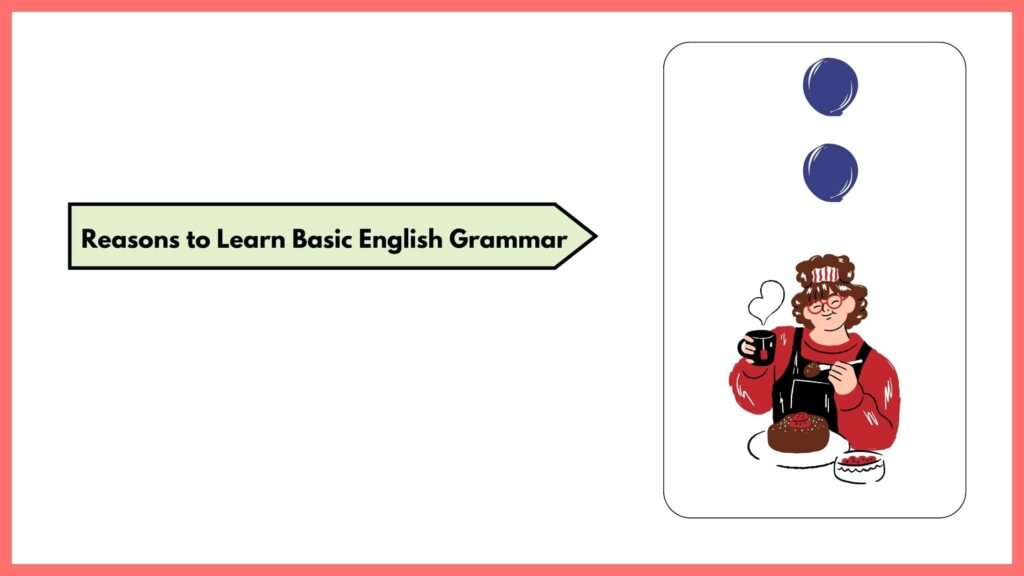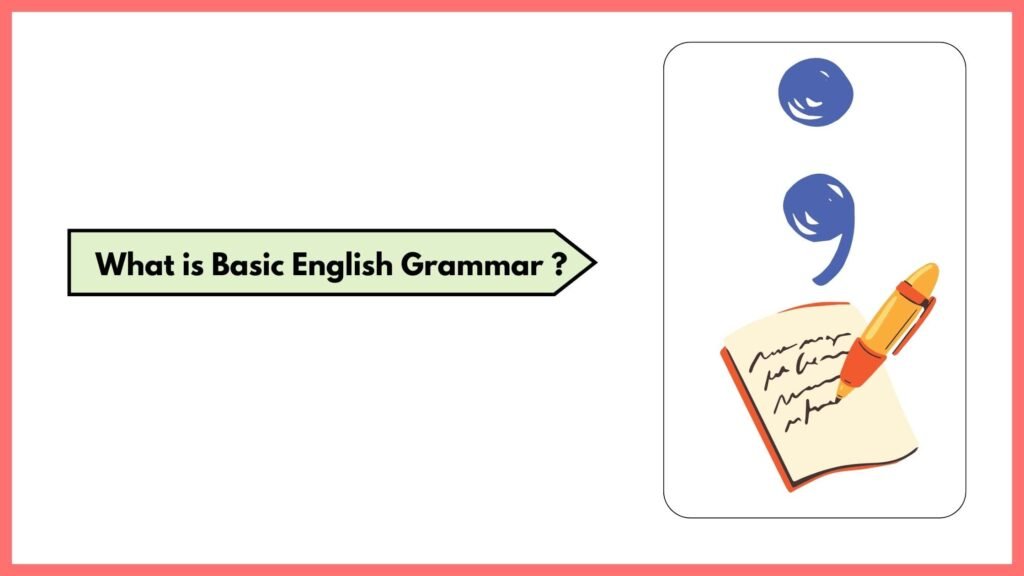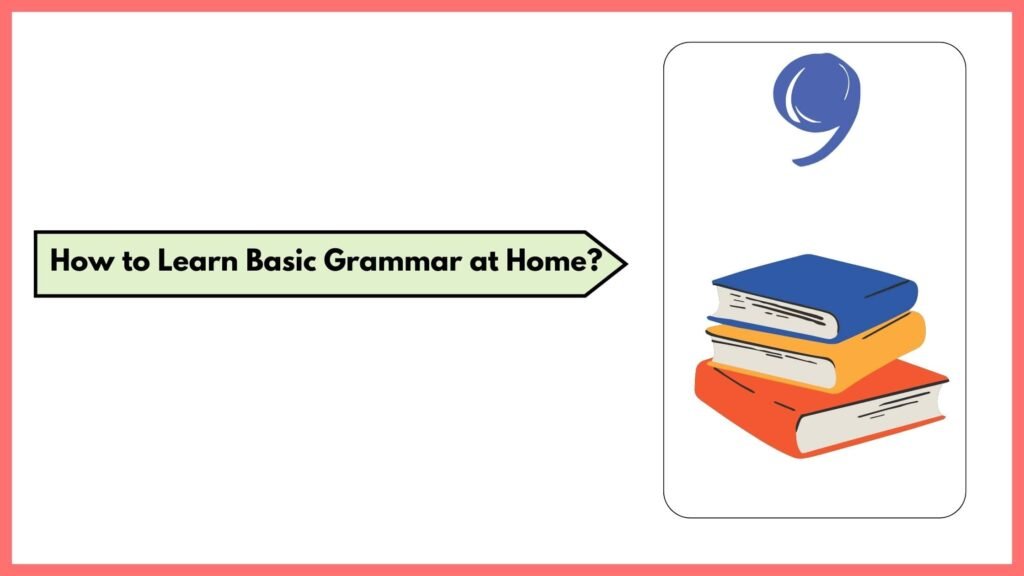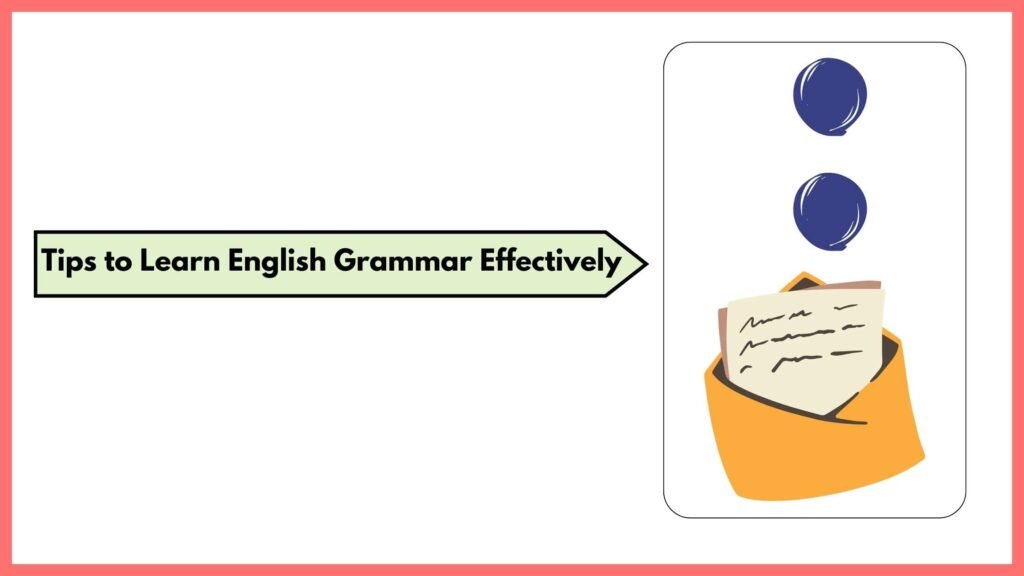First, let’s talk about why learning basic grammar is a must. Learning basic English grammar is a fundamental step in acquiring proficiency in the language. If you aspire to become fluent in English but overlook the importance of the ‘learning grammar’ phase, your progress may be limited. Therefore, start by mastering the basic rules of grammar, practice them consistently, and witness automatic improvement in your speaking and writing skills.
Moreover, a solid understanding of basic English grammar supports effective communication, enhances writing skills, contributes to professional success, and opens doors to cultural and intellectual enrichment. Learning English basic grammar is essential for several reasons.
Reasons to Learn Basic English Grammar

- Communication:
- Grammar provides the structure and rules for constructing sentences. Understanding grammar helps you communicate more effectively, ensuring that your ideas are clearly expressed. This is crucial in both spoken and written communication.
- Clarity and Precision:
- Proper grammar usage enhances clarity in communication. It helps you convey your thoughts accurately, reducing the likelihood of misunderstandings. Clear communication is especially important in academic, professional, and personal contexts.
- Writing Skills:
- Good grammar is fundamental for writing coherently and persuasively. Whether you’re writing essays, reports, emails, or any other form of written communication, a solid grasp of grammar enhances the quality of your writing.
- Professionalism:
- In many professional settings, proper grammar is a reflection of your attention to detail and professionalism. Employers often value employees who can communicate clearly and accurately.
- Academic Success:
- In academic settings, proper grammar is essential for writing assignments, essays, and research papers. Academic success is often linked to the ability to express ideas in a grammatically correct manner.
- Standardization:
- Grammar provides a standardized set of rules that enables effective communication across different English speakers and writers. This standardization facilitates understanding among people with diverse linguistic backgrounds.
- Confidence:
- Having a strong foundation in grammar boosts your confidence in using the English language. It empowers you to express yourself more confidently, whether you’re engaging in casual conversations, public speaking, or any other form of communication.
- Cultural and Literary Appreciation:
- Understanding grammar allows you to appreciate and engage with English literature and various forms of media. It opens doors to a rich cultural and literary heritage, enabling you to enjoy and analyze written works more deeply.
- Language Learning Progress:
- As you progress in learning English, a solid understanding of basic grammar provides a framework for more advanced language skills. It serves as a foundation for learning more complex grammar structures and expanding your vocabulary.
What is Basic English Grammar?

These are just a few basic English grammar concepts, but there’s much more to explore as you delve deeper into English grammar. Regular practice, reading, and exposure to the language will help you become more comfortable with these rules and structures over time.
English grammar is the set of rules and structures that govern the use of the English language. Here are some basic concepts to get you started:
- Parts of Speech: Parts of speech are the basic grammatical categories into which words can be classified based on their functions and roles within a sentence. There are eight traditional parts of speech in English:
- Noun: A person, place, thing, or idea (e.g., cat, London, happiness).
- Verb: An action or state of being (e.g., run, eat, is).
- Adjective: Describes a noun (e.g., happy, big, red).
- Adverb: Describes a verb, adjective, or other adverb, often answering the questions how, when, and where (e.g., quickly, yesterday, here).
- Pronoun: Replaces a noun (e.g., he, she, it).
- Preposition: Shows the relationship between a noun and another word in the sentence (e.g., on, in, under).
- Conjunction: Connects words, phrases, or clauses (e.g., and, but, or).
- Interjection: Expresses strong emotion (e.g., wow, oh, yay).
- Sentence Structure: Sentence structure is the way words are arranged to form a grammatically correct sentence. Basic English sentence structure typically consists of a subject, a verb, and an object. Let’s break it down:
- A basic sentence usually consists of a subject (who or what the sentence is about) and a predicate (what the subject is doing or the state it is in).
- Example: She (subject) sings (predicate).
- Sentences can be simple, compound (joining two independent clauses with a conjunction), or complex (containing an independent clause and one or more dependent clauses).
- A basic sentence usually consists of a subject (who or what the sentence is about) and a predicate (what the subject is doing or the state it is in).
- Tenses: Tense in English grammar indicates the time of an action, event, or state of being. There are three primary tenses: past, present, and future. Each of these tenses has four aspects: simple, continuous (also called progressive), perfect, and perfect continuous. Let’s explore each tense:
- English has different tenses to indicate the time of an action: past, present, and future. Each tense has simple, continuous, perfect, and perfect continuous forms.
- Articles: In English grammar, articles are words that define a noun as specific or unspecific. Understanding when and how to use articles is important for constructing grammatically correct sentences in English
- Articles include “a,” “an,” and “the.” “A” and “an” are used before singular, countable nouns, while “the” is used before both singular and plural nouns to indicate a specific item.
- Punctuation: Punctuation is a set of marks that clarify the meaning of written language. Proper punctuation is essential for clear communication in English writing.
- Common punctuation marks include the period (.), comma (,), question mark (?), exclamation mark (!), colon (:), semicolon (;), apostrophe (‘), quotation marks (” “), and hyphen (-).
- Subject-Verb Agreement: Subject-verb agreement is an essential concept in English grammar. It refers to the need for the subject and the verb in a sentence to match in number (singular or plural).
- The subject and the verb in a sentence must agree in number (singular or plural).
How to Learn Basic Grammar at Home?

To learn basic English grammar, you can join coaching classes, or you can also learn online with paid resources. But if you want to learn English grammar for free at home, that is also possible. I am going to share a few resources from which you can learn English grammar on your own.
1. Grammar Monster:
For free English grammar lessons and tests, ‘Grammar Monster’ could be the best option because they offer hundreds of lessons, tests, games, and word lists covering basic vocabulary to tips for advanced writers. Grammar Monster is overloaded with teaching resources, including video seasons, printable word lists, and shareable tests. The most important thing is you will get everything for free. Yes, there are a couple of ads, and that’s how they fund their site. But if you don’t want to spend any money on learning English grammar, I strongly recommend the Grammar Monster site.
2. FluentU:
Another website is ‘FluentU.’ This website offers you a variety of learning resources, such as videos, quizzes, and flashcards. These learning tools can help you learn English grammar in a fun and engaging way. However, ‘FluentU’ is not completely free; you will get a 14-day free trial, which is also considered a good option to some extent. After 14 days, you can decide whether you want to continue with the paid version or no
3. British Council:
The British Council website offers clear and simple grammar explanations to help you revise and practice English grammar points. This website claims that it provides you with the right tools to help you interact confidently in the real world. The online exercises will help you check your understanding of grammar. You can also test your grammar level. After determining your grammar level, you can start learning grammar from that point. For example, if your grammar level is B1, then you don’t need to review A1 level. Simply start exploring English grammar from B1 to B2. To begin your journey to learn English grammar, the British Council could be the third option.
Tips to Learn English Grammar Effectively

If you are learning Basic English grammar on your own, it could be a rewarding and manageable process. I am going to give you some tips to make the learning experience easier and more effective:
1. Set goals
First, you should set clear and achievable goals. For example, focus on mastering a particular tense, or article, or improving sentence structure. Concentrate on one of them and practice.
2. Start with basics
I recommend beginning with fundamental concepts like parts of speech, sentence structure, and basic tenses. Once you establish a strong foundation, it will become easier for you to build more advanced skills afterward.
3. Practice regularly
Practice is the most important step toward mastering anything because consistent practice is the key. You don’t need to go big; just start small. I mean, you don’t need to practice English for the whole day. Allocate one or two hours daily to learn and practice, then stick to it no matter what.
4. Engage in conversations
Practicing speaking along with learning will drive you to the next level. When you converse with your friends or family members in your learning language, you will receive immediate feedback because conversations allow you to apply grammar rules in a practical context.
5. Keep a Grammar journal
Maintaining a journal to note down grammar rules, examples, and your own sentences will help you track your learning journey. The process of writing helps reinforce learning.
Conclusion
Remember, everyone learns differently, so experiment with different methods and find what works best for you. The key is to make learning enjoyable and a regular part of your routine.
Related Post: ”C1 GRAMMAR: QUICK QUESTIONS AND ANSWERS”